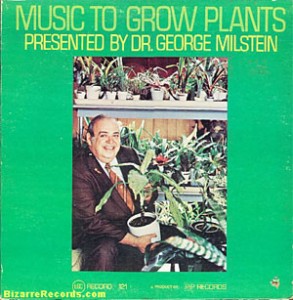Talking to Plants

image source: bizarrerecords.com
- source: http://drystonegarden.com/index.php/2009/02/talking-to-plants/
I wonder if Dr. Millstein does any vocals on the album. Probably not. I’ve done some looking around on the internet for information about talking to plants, but never found anything definitive. Anita and I are convinced it works, and a lot of the green thumb gardeners that we know swear by it. I’ve heard of various studies — one where they reportedly hooked up plants to an electrocardiograph and measured the physiological changes when people spoke to them, supposedly the talking caused measurable responses — but I haven’t actually seen any studies, only hearsay. Most of the info on the internet deals with the effect of music, rather than talking.
The idea goes back at least as far as 1848, when a German, Gustav Theodor Fechner, claimed that plants had souls. Fechner was interested in mathematically measuring the relationship between stimuli and sensation, for instance the difference between the weight of an object and the perceived weight of it. I don’t know what kind of experiments he did with his plants, but I picture him shouting at his ficus until it dropped its leaves.
In the 1970’s, a woman named Dorothy Retallack did a bunch of experiments with classical music and hard rock. Led Zeppelin made the plants die.
More recently, Mythbusters tested it out. Their plants were harder rocking that Retallack’s, growing best with death metal. From Wikipedia:
Seven small greenhouses were set up on the M5 Industries roof. Four were set up with stereos playing endlessly looping recordings (as having the MythBusters actually talk to the plants could contaminate the samples with their expelled carbon dioxide): Two of negative speech, two of positive speech (Kari and Scottie each made one positive and one negative inducing soundtrack), a fifth with classical music and a sixth with intense death metal music. A seventh greenhouse, used as a control sample, had no stereo. The greenhouses with the recordings of speech grew better than the control, regardless of whether such talk was kind or angry. The plants in the greenhouse with the recording of classical music grew better, while the plants in the greenhouse with the recording of intense death metal grew best of all.
The rated the myth as “plausible.”
Various other people have tried similar tests, usually finding that plants grow better with music.
ResearchPennState reports on Korean researchers with a possible explanation, finding two genes that respond to sound:
Research supports Marini’s guess. A 2007 paper from scientists at South Korea’s National Institute of Agricultural Biotechnology proposed that two genes involved in a plant’s response to light—known as rbcS and Ald—are turned on by music played at 70 decibels. “This is about the level of a normal conversation,” says Marini. The Korean researchers found differing responses depending on the frequency of the sound. The higher the frequency, the more active was the gene response.
Regarding why plants would have evolved to respond to vibration in the first place, Marini speculates that it may have occurred as a way to help them survive in windy environments. “Plants exposed to wind produce a growth-retardant hormone called ethylene, which causes the plant to be shorter and to have thicker stems. So plants exposed to wind can better survive very windy conditions.”
Other possible explanations include the myth that talking causes you to exhale carbon dioxide on the plants, but the math doesn’t work out for that theory; talking wouldn’t create a large enough quantity of carbon dioxide to have a significant impact. Another explanation is that the talking causes you to pay attention to the plants and their needs, an explanation that seems condescending and dismissive, although probably somewhat true. There must be more to it than that. Plants are much more aware of their surroundings than we realize. A lot of factors go into growing a healthy plant, and science is often far behind the gardeners in identifying those factors. If a ton of gardeners say that talking to plants helps them grow, then it’s a wise move talk to your plants. Not necessarily every plant — I wouldn’t waste my breathe on an agapanthus or even a phormium — but certainly the ones that you really want to see thrive. And I bet that George Millstein album works.
If anyone knows of any legit studies of talking to plants, let me know, I’d be into seeing them.
ryan 2/21
No comments:
Post a Comment